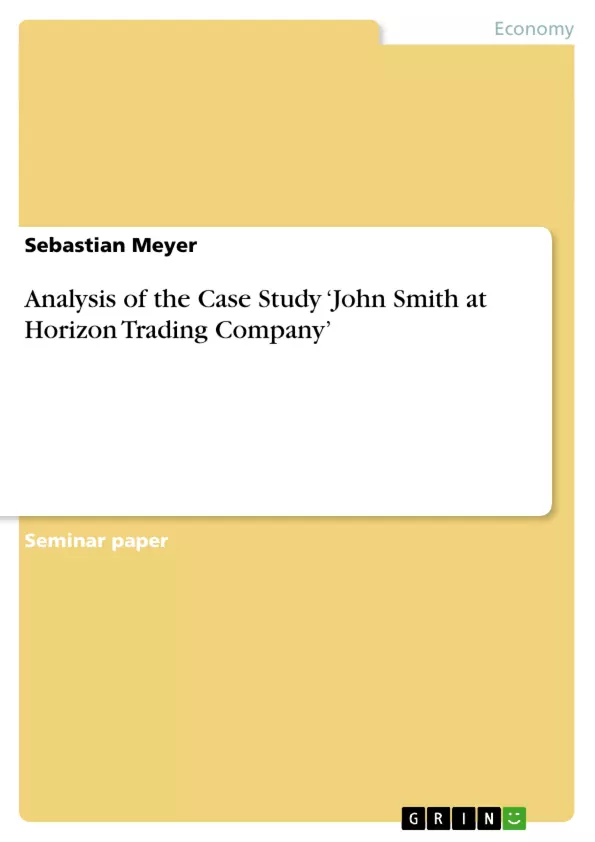The present assignment is based on the case study ‘John Smith at Horizon Trading Company’. After a short summary the objective is to analyse and to evaluate the case study from an ethical perspective. Furthermore, the teleontological and deontological approaches will be applied as well as Kohlberg’s model of moral dilemmas
Inhaltsverzeichnis (Table of Contents)
- Introduction
- Summary
- Kohlberg's Moral Dilemmas
- Preconventional Level
- Stage 1
- Stage 2
- Conventional Level
- Stage 3
- Stage 4
- Postconventional Level
- Stage 5
- Stage 6
- Preconventional Level
- The Teleological and the Deontological Approach
- Teleological Approach
- Egoism
- Utilitarianism
- Deontological Approach
- Justice based principles
- Rights based principles
- Teleological Approach
- Bibliography
Zielsetzung und Themenschwerpunkte (Objectives and Key Themes)
The assignment focuses on analyzing and evaluating the case study ‘John Smith at Horizon Trading Company’ from an ethical perspective. It applies the teleological and deontological approaches as well as Kohlberg's model of moral dilemmas to gain a comprehensive understanding of the ethical challenges faced by the protagonist, John Smith, in an international business context.
- Ethical Decision-Making in Business
- Moral Dilemmas in International Business Environments
- Kohlberg's Stages of Moral Development
- Teleological and Deontological Ethical Frameworks
- Bribery and Corruption in Global Business Practices
Zusammenfassung der Kapitel (Chapter Summaries)
The introduction provides an overview of the assignment's purpose and the case study being analyzed. The summary chapter presents the main characters, the company, and the ethical dilemma faced by John Smith. It highlights the prevalent issue of bribery in Russia, the company's tax evasion practices, and John's inner struggle with moral conflict.
The chapter on Kohlberg's Moral Dilemmas explores the theory of cognitive moral development, focusing on the preconventional and conventional levels. It examines how John's ethical values are challenged by the situations he encounters, including the party where he hears about bribery, the training in tax evasion techniques, and the Russian tax inspector's visit.
The chapter on The Teleological and the Deontological Approach examines different ethical frameworks, including egoism, utilitarianism, justice-based principles, and rights-based principles. This chapter analyzes how these frameworks can be applied to understand John's ethical dilemma and the company's actions.
Schlüsselwörter (Keywords)
The primary keywords and focus topics of the text are: business ethics, international business, moral dilemmas, Kohlberg's theory of moral development, teleological ethics, deontological ethics, bribery, corruption, tax evasion, cultural differences, ethical decision-making, and case study analysis.
Frequently Asked Questions
What ethical challenges does John Smith face?
John Smith faces dilemmas regarding bribery, corruption, and tax evasion practices within the Horizon Trading Company, specifically in the Russian market.
How is Kohlberg’s model applied to this case?
The assignment uses Kohlberg's stages of moral development to analyze whether John Smith's decisions are based on avoiding punishment, social conformity, or universal ethical principles.
What is the teleological approach in business ethics?
The teleological approach focuses on the consequences of an action, evaluating its morality based on the resulting "good" or "utility" (Utilitarianism) or self-interest (Egoism).
What is the deontological perspective on bribery?
From a deontological view, bribery is seen as inherently wrong because it violates universal duties, justice-based principles, and moral rules, regardless of the outcome.
How do cultural differences impact ethical decision-making?
The case study highlights how business practices that are considered unethical in one country (like bribery) might be prevalent or expected in another, creating conflict for international managers.
- Arbeit zitieren
- B.A. Sebastian Meyer (Autor:in), 2004, Analysis of the Case Study ‘John Smith at Horizon Trading Company’, München, GRIN Verlag, https://www.grin.com/document/75507



